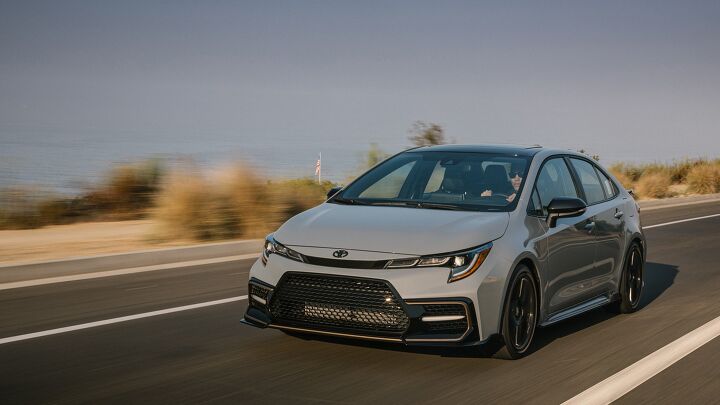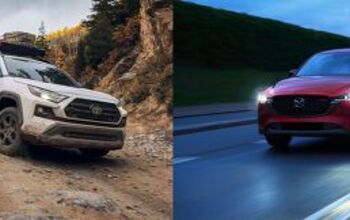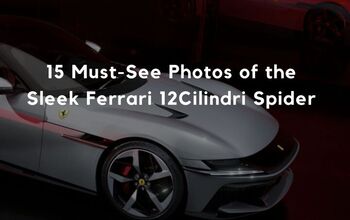More Than a Million Toyota and Lexus Models Recalled for Airbag Sensor Issue

Despite having been around for decades, vehicle airbags are not infallible or immune to manufacturing defects. There was the massive and ongoing Takata airbag recall, and automaker continue issuing recall actions to correct or prevent failures of airbag sensor systems. Toyota is the latest, as its most recent action involves around 1.1 million vehicles from between 2020 and 2022 for malfunctioning airbag sensors.
The recall includes:
· 2020-2021 Toyota Avalon and Avalon Hybrid
· 2020-2022 Camry and Camry Hybrid
· 2020-2021 Corolla
· 2020-2021 Highlander and Highlander Hybrid
· 2020-2021 RAV4 and RAV4 Hybrid
· 2021 Sienna Hybrid
· 2021 Lexus ES 250
· 2020-2022 ES 300h
· 2020-2021 ES 350
· 2020-2021 RX 350 and RX 450h
The problem stems from the airbag’s Occupant Classification System, which is a system of sensors in the front seats that tell the airbag how to deploy based on the weight of the person sitting in the seat. The sensors in affected Toyota models may have been improperly manufactured, “causing a short circuit.” The automaker said that the failure “would not allow the airbag system to properly classify the occupant’s weight, and the airbag may not deploy as designed in certain crashes, increasing the risk of injury.”
Toyota is not the first and won’t be the last automaker to recall vehicles for issues with their occupant classification systems. Last year, GM recalled several SUVs for the same problem, and several years before that, Nissan recalled vehicles to replace some sensors in select vehicles.
[Image: Toyota]
Become a TTAC insider. Get the latest news, features, TTAC takes, and everything else that gets to the truth about cars first by subscribing to our newsletter.

Chris grew up in, under, and around cars, but took the long way around to becoming an automotive writer. After a career in technology consulting and a trip through business school, Chris began writing about the automotive industry as a way to reconnect with his passion and get behind the wheel of a new car every week. He focuses on taking complex industry stories and making them digestible by any reader. Just don’t expect him to stay away from high-mileage Porsches.
More by Chris Teague
Latest Car Reviews
Read moreLatest Product Reviews
Read moreRecent Comments
- Ted Bryant Agree with Mikey.Manual. Any manual transmission car. 1) can't text-and-drive, 2) forces driver to pay attention, 3) perfect security because most thieves can't drive stick, 4) fun to drive, 5) friends won't drive the car (they can't drive stick), 6) compression start -- never get stuck, and 7) will always be able to drive any vehicle anywhere. Did this for both kids -- after a couple weeks of complaining, they finally got to it, and now only drive manual. And they are both great drivers. But their friends do poke them for driving stick -- "oh neat - a manual. do you bake your own bread and sew your own clothes too..."
- Mikey My youngest girl ( now 48 ) dated a guy that had a Beretta with a stick shift. The Dude liked Beer and weed. too much for my liking..I borrowed my buddy's stick shift Chevette and give her short course on driving a manual .. I told her if the new BF has more than 2 beer or any weed ..You drive ...I don't care how many times you stall it, or or of you smoke the clutch . She caught on quite well ,and owned a succession of stick shift vehicles...An as an added bonus she dumped the guy.
- Blueice "Due to regulation/govt backing, China is poised to dominate BEV/battery production, just as they do solar panel production, drone production, etc.Taiwan dominates production of certain types of chips due to regulation/govt backing and we saw how precarious such a situation is (especially with the PRC increasingly becoming aggressive towards Taiwan).That's why regulation/govt backing is aiming to build up local chip manufacturing."BD2, these businesses and or industries are not free market enterprises, buttcorporatist, bent on destroying their competitors with the use of governmentalunits to create monopolies. How safe are world consumers when the preponderance of computer chipsare made in one jurisdiction. Do you what Red China controlling any industry ??And it is well known, concentrated markets control leads to higher prices to end users.
- Master Baiter I told my wife that rather than buying my 13YO son a car when he turns 16, we'd be better off just having him take Lyft everywhere he needs to go. She laughed off the idea, but between the cost of insurance and an extra vehicle, I'd wager that Lyft would be a cheaper option, and safer for the kid as well.
- Master Baiter Toyota and Honda have sufficient brand equity and manufacturing expertise that they could switch to producing EVs if and when they determine it's necessary based on market realities. If you know how to build cars, then designing one around an EV drive train is trivial for a company the size of Toyota or Honda. By waiting it out, these companies can take advantage of supply chains being developed around batteries and electric motors, while avoiding short term losses like Ford is experiencing. Regarding hybrids, personally I don't do enough city driving to warrant the expense and complexity of a system essentially designed to recover braking energy.


































Comments
Join the conversation
Is this new batch of faulty airbags also Damned Takatas? Not clear from speedreading the article (which is all the time I am willing to invest in it)
Toyota likes to Stall things until they don't have to pay up and fix their Junk